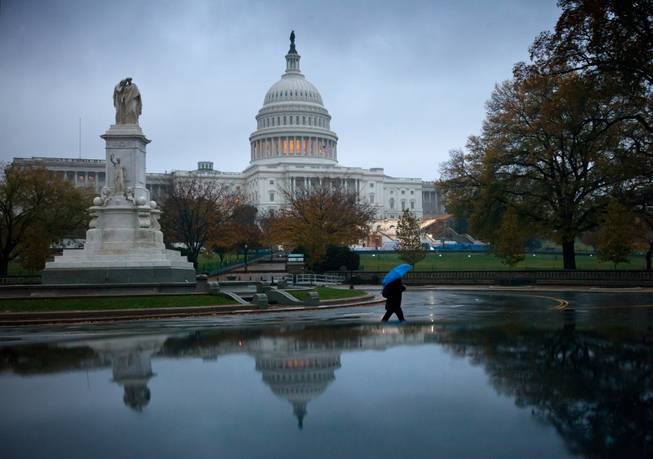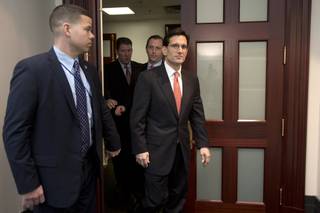
J. Scott Applewhite / AP file
FILE - In this Nov. 13, 2012 file photo, a man walks in front of the Capitol in Washington. The debate in Washington over taxes and spending is likely to continue damaging the fragile economy well into 2013. The political standoff has already taken an economic toll, creating uncertainty about the future and discouraging consumers from spending and businesses from hiring and investing.
Tuesday, Jan. 1, 2013 | 8:23 p.m.
Related stories
- Political brinksmanship still threatens US economy
- Fiscal cliff conclusion may not come before the new Congress
- House expected to send fiscal cliff deal back to the Senate
- Why lawmakers’ failure to beat fiscal cliff deadline might benefit them
- Grand bargains give way to legislative quick fixes
- White House, Senate Republicans reach ‘fiscal cliff’ deal
- Biden and Reid take good cop-bad cop approach to negotiating with Republicans
- Payroll tax hike to take $1,000 bite out of average worker’s annual pay
- Country to head over fiscal cliff as lawmakers continue negotiating
- More Sun political news
The House of Representatives voted to back the Senate-White House deal on the "fiscal cliff" Tuesday night, ensuring that more than 99 percent of wage earners won’t see their taxes go up in 2013.
The vote of 257-167 came on the heels of the Senate’s voting 89-8 in the wee hours of the morning to accept the same deal. The House vote came only 37 hours before the 112th congressional session was constitutionally mandated to disband.
All members of the Nevada delegation, save for Rep. Mark Amodei, voted in favor of it.
But it wasn’t an easy road.
Congressional leaders went back and forth with the White House for months over how to avoid the onset of tax hikes and across-the-board “sequestration” cuts set to take effect on Jan. 1.
Discussions that started between President Barack Obama and House Speaker John Boehner eventually gave way to post-Christmas negotiations between Senate Leaders Harry Reid and Mitch McConnell. In the last 48 hours of 2012, it was McConnell and Vice President Joe Biden who struck a deal to permanently extend cut tax rates from the Bush administration on incomes up to $400,000 -- $450,000 for couples filing jointly -- allowing rates for income above that to rise from 35 percent to 39.6 percent in 2013.
The deal also extends unemployment benefits, sales tax deductions, mortgage debt relief deductions and energy tax deductions for a year, and makes permanent a correction to the alternative minimum tax and the $5 million exemption on estate taxes, which is now pegged to inflation.
Senators conferred through the night Monday, as Democrats expressed concerns with the tax threshold; they had wanted to see tax cuts extended only up to $250,000. Ultimately, 49 of the 53 Senate Democrats and Democrat-leaning Independents voted for the deal, along with 40 of 47 Republicans.
When the House of Representatives returned to the Capitol at noon, however, it was clear that the lawmakers in the House weren’t ready to follow in lockstep.
Biden returned to the Capitol on New Year’s Day to give Democrats what many described as an especially hard sell on the deal. Meanwhile, Republicans met in the Capitol basement twice, and for several hours Tuesday afternoon were threatening to amend the Senate’s fiscal cliff deal with an amendment to include more than $300 billion of spending cuts along with it.
By Tuesday evening, it was clear Republicans were going to drop that threat, and allow the Senate-passed fiscal cliff bill to come to the House floor for a clean, up-or-down vote. But Republicans did not carry that vote: In fact, over the 257 lawmakers that voted yes, only 85 were Republicans.
Boehner had been under pressure from Democrats for the last few weeks to allow a fiscal cliff vote, even if he could not secure a majority of Republicans to back the deal. He resisted, but by Tuesday, chose to promote the bipartisan deal over the unity of his Republican conference.
Boehner and Rep. Paul Ryan voted for the fiscal cliff deal, while Majority Leader Eric Cantor and Whip Kevin McCarthy voted against it.
Several Republicans, including Amodei, complained that the lack of spending cuts in the deal -- and the lack of resolution on “sequestration” cuts -- made it impossible for them to support the deal.
“I respectfully decline to support a measure that raises $41 in revenue for every dollar of spending cuts,” Amodei said in a statement released after the vote. “This is not a balanced approach. The status quo on the federal budget deficit and federal debt is not acceptable... I will not tell the Nevadans I represent that this bill is anything resembling a solution to the fiscal and economic sickness that threatens all of us.”
But other Republicans –- albeit a smaller number -– decided the benefits of the deal outweighed its faults.
“While I would have preferred to see more spending cuts in this final package, I did vote for this compromise because ultimately it was more important to protect Nevada families and business from these unprecedented tax increases,” Rep. Joe Heck (R-NV) said in a statement released after the vote.
The deal does not address or try to undo sequestration cuts, but postpones the onset of those sequestration cuts, which amount to about $500 billion over 10 years, for two months.
The deal also does not address the growing national debt, which exceeded the country’s borrowing authority over New Year’s Eve. Treasury Secretary Tim Geithner has said he could prevent the country from defaulting on its obligations for about the next two months, setting up a new showdown at the end of February.
In fact, the deal is expected to add about $3.6 trillion to the debt over the next decade, according to an initial estimate by the Congressional Budget Office.
Even with the permanent extension of tax cuts for most wage-earners, the deal doesn’t set the matter of tax reform to rest, either.
But the president and supporters praised it as an important first step.
“Today’s agreement enshrined a principle in law that I think will last as long as I am president... we're going to have to continue to move forward in deficit reduction, but we're going to have to do it in a balanced way,” Obama said, minutes after the House passed the fiscal cliff deal. “The sum total of all the budget agreements we have reached so far proves that there is a path forward.”
But, he added, he hoped it would get easier in the future.
“The one thing that I think hopefully the new year will focus on is to see if we can put a package like this together with a little less drama... that will not scare the heck out of folks quite so much,” Obama said.
Congress’ votes actually came one day too late to keep the country from going over the fiscal cliff. That happened at the turn of the New Year. But no real effects of the fiscal cliff had been realized because sequestration cuts were already being mitigated by an ongoing federal budget, risen income tax rates hadn’t yet been reflected in paychecks and the markets were closed on New Year’s Day.
“With markets reopening around the world and all eyes focusing on whether this institution can govern, this legislation allows us to get done what we need to get done,” said Rep. Sander Levin, the ranking Democrat on the House Ways and Means committee.


Join the Discussion:
Check this out for a full explanation of our conversion to the LiveFyre commenting system and instructions on how to sign up for an account.
Full comments policy